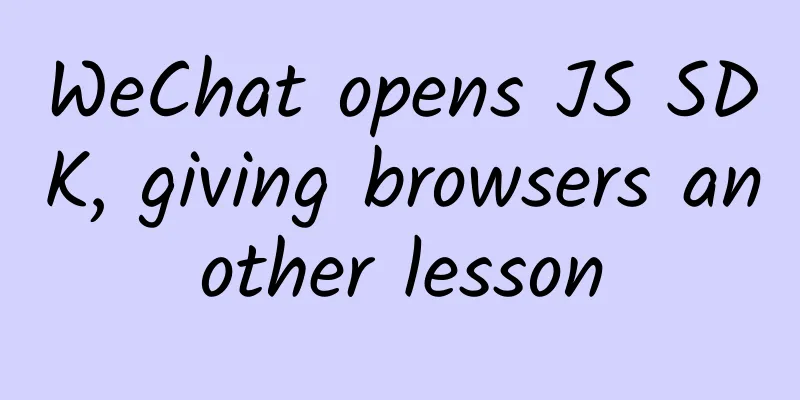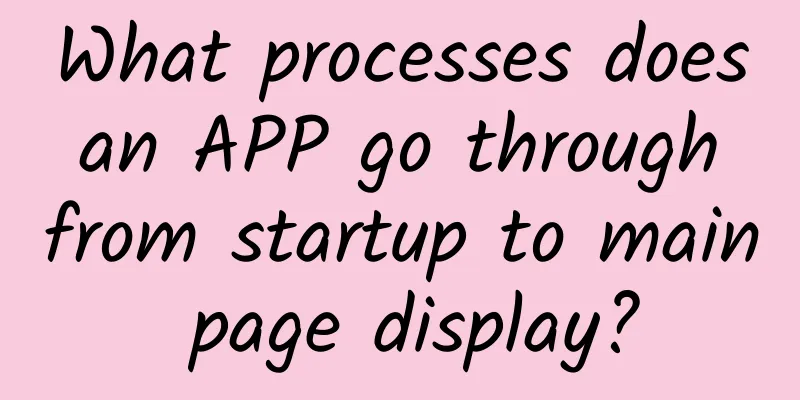WeChat opens JS SDK, giving browsers another lesson

|
2015 has just begun, and the WeChat JS SDK was released, which shocked everyone, and the HTML5 industry has been full of good things. The concept of JS SDK actually existed in the open platforms of Weibo and Taobao a long time ago. Mobile QQ also launched several enhanced APIs some time ago, but none of them had a big impact. After the small witch, the big witch finally appeared. The SDK opened by WeChat this time has reached another level. How powerful can the web really be? HTML5’s Counterattack Actually, WeChat had some JS APIs before, such as sharing. But this time, it opened dozens of APIs such as shooting, recording, voice recognition, QR code, map, payment, sharing, card coupons, etc. This news did not need to be promoted and instantly filled the circle of friends of HTML5 practitioners. Because WeChat opens a new window for all those who do web development: using js, you can also call on various powerful native capabilities! Objectively speaking, WeChat has many powerful components, such as code scanning, which is not as good as WeChat for many native applications. Now HTML5 developers have made a comeback. They were unable to implement code scanning before, but now they can easily develop code scanning applications, and the effect is better than many native applications (of course, the premise is that your web application runs under the management of WeChat). The first to benefit are the Tencent apps built into WeChat, such as Dianping, Didi Taxi, and JD Shopping. Previously, WeChat embedded the HTML5 version of Didi Taxi under the wallet category in a very awkward way. The experience of that version was much worse than the native version of Didi. You could only type without speaking, and there was no map to see where the driver was. In the mobile Internet era where experience is king, this version that can be used now appears under the wallet category of WeChat, which is actually WeChat's failure. But now it is different. The WeChat version of Didi Taxi will have capabilities that are no less than its native app. And the app can be opened in seconds without downloading the app. Dianping will benefit even more, not only because its WeChat embedded version will be greatly enhanced. Due to different usage scenarios, Didi can only share red envelopes among friends, which is a bit far from the business scenario of taking a taxi; while Dianping can share discounts or recommend merchants among friends, directly generating consumption, and the effect of diverting traffic through the relationship chain will be very obvious. When HTML5 was finalized, I wrote an article that mentioned that one of the great advantages of HTML5 is that it breaks the App silos and allows users to directly browse through the app subpages. If a coupon from Dianping is shared by a friend, users can directly access the merchant's interface by clicking on the shared content and then purchase the item directly. This is something that even Dianping's native app cannot do. WeChat has shown us a new web world: its capabilities are as strong as native applications, but it is further ahead of native applications in application acquisition and traffic conversion. Soon, we will see all kinds of public accounts and WeChat stores fully upgraded to support WeChat JS SDK. Then we will find that the mobile browser with the largest market share is WeChat without an address bar. The traditional thinking of browsers has been broken WeChat’s slap in the face has dealt a heavy blow to browser vendors, but it is difficult for browser vendors to fight back because it challenges their traditional thinking. When the HTML5 specification was being formulated, many people had a mindset: the web is open, and the address bar and hyperlinks may lead to any malicious web pages, so we cannot make HTML5 too powerful, as it will cause security issues. WeChat gave these people different answers. First of all, the capabilities that WeChat has opened up do not involve APIs that are too private, such as personal sensitive information or friend relationships. Of course, this will probably never be opened up. The most important thing is that all websites that use WeChat JS SDK must use their real names to authenticate and pay WeChat fees. It has adopted a strategy similar to that of Apple App Store, where the system operator is responsible for ensuring the safety of users. This new web world built by WeChat is no longer open and is managed by WeChat. It has no address bar at all, and all web pages that can use WeChat's enhanced capabilities must be authenticated. In fact, the field of HTML5 enhancement has been developed for many years and has already had industry standards, HTML5Plus.org. This time, WeChat has thrown all these standards aside and is focused on building its own ecosystem. In addition to the different management models, WeChat's design reflects its different understanding of user experience. In fact, most of us agree that typing URLs in mobile browsers is a bad experience, but browser manufacturers have always stuck to the old ways. Let’s deconstruct the design of WeChat. In WeChat, since there is no address bar, how do you get to a web application? How many web portals does it have? The answer is 5.
There is no traditional address bar or even search in these five entrances. When the web was first born, people actively accessed web information by visiting websites through the address bar. When there were too many websites, they began to use search engines. Google's page rank algorithm tells netizens that the more web pages are linked, the higher the value of this web page. In WeChat's understanding, most people access web information passively. There is no address bar, no search, and no page rank. The web content you need is what your friends send you and what you subscribe to from public accounts. If you really want to actively get the content, there is no address bar, but there is a scan function. But does scanning no longer fall under WeChat's management? Of course not. Many App developers are troubled by the fact that WeChat cannot download and install their APKs after their APK addresses become QR codes. This is something that browsers will not do. If users want to download something, they will be allowed to do so, and at most they will be given a warning that it may be unsafe. But WeChat says that APKs can only be downloaded from links in App Store. Do you not accept this? Then don't use scanning. In this way, WeChat has built a unique web ecosystem. It has relationship chain recommendations, no search engines are needed; it has a messaging system, no email is needed; it has an enhanced browser, and payment and other closed-loop business methods. In the end, a complete and closed web world appeared in WeChat. Information is generated, circulated, and realized here. WeChat is enough on your mobile phone, and you can do everything. Tencent’s Strategy Did WeChat only enhance a number of API capabilities? No, do you still remember the X5 browser kernel released by Tencent some time ago? WeChat was actually able to open these JS SDKs a long time ago, and even opened several of them at one point and then took them back. Why is it developing the web ecosystem so vigorously now? I thought of Ma Huateng's words some time ago that WeChat is just a "standing ticket", and he also proposed a new vision for Tencent: connecting everything. Zhang Xiaolong also carefully read KK's "Out of Control" and proposed that WeChat should create a forest instead of a palace. In fact, these things are related. Only when there is a strategic need will there be products that support the strategy, such as X5 and WeChat JS SDK. The difference between standing tickets and sleeping berths is that one can make money while lying down. To know how to make money while lying down, just look at Alibaba. In the huge ecosystem established by Alibaba, countless people work hard to make money every day, and Alibaba reaps the benefits. Tencent has tried several times to develop e-commerce, but it can never make as much money as Alibaba. It can only go its own way. As Ma Huateng said, return to the origin and connect everything. If e-commerce can't be done, then don't do it, spin it off and inject capital into JD.com. If search can't be done, then don't do it, spin it off and inject capital into Sogou. No longer staring at Alibaba and Baidu every day, free up all your energy to achieve the vision of connecting everything in the mobile Internet era. That's right, based on WeChat, Tencent will eventually build an ecosystem controlled by it. For a tool, the best technical route to build an ecosystem is the web. Strengthening HTML5 is the only way to create a better ecosystem. The opportunity to do this now also coincides with the rise of HTML5. On the one hand, the continuous improvement of mobile phone hardware has made HTML5 perform better. On the other hand, Apple's attitude towards HTML5 is open, or Apple as a whole is open. On the one hand, the market share of iOS devices is much lower than that of Android. On the other hand, Cook is indeed not as strong as Jobs, so Apple's overall attitude is open. Some time ago, iOS8 was released, and Apple opened its own js acceleration engine Nitro to third-party manufacturers to enhance the performance of HTML5 on iOS devices. At this time, the WeChat JS SDK is online, and there is no need to worry about failing to pass the Appstore review as before. And the fact is actually the opposite. The version with WeChat JS SDK has actually been updated to the Appstore a long time ago, but the calling interface was only announced to developers a few days ago. But no matter what, this is a test of Apple's bottom line. If it is limited to China, it is a regional behavior, but WeChat has actually spread all over the world. When overseas developers also develop WeChat-exclusive enhanced webs in large numbers, how will Apple and Google view this new cross-platform overlord? Opportunities for developers Whatever, let the giants deal with their own problems. Entrepreneurs and developers like us should seize this opportunity to develop ourselves quickly, and quickly use WeChat JS SDK to develop amazing HTML5 applications and grab users first. For the comparative technology behind, developers who are interested in developing JS SDK can continue to read on. The JS SDK category list opened by WeChat this time is as follows:
The enhanced routes of WeChat built-in applications such as Didi Taxi and Dianping will basically evolve in the same way as their native apps. Other developers still need to operate their own public accounts, which are currently divided into subscription accounts and service accounts. Subscription account developers mostly provide information. So what can be done with the information using JS SDK? Enrich the content format, that is, in addition to pictures and texts, add audio capabilities. Subscription accounts similar to radio stations will have a chance to rise. However, WeChat has not yet opened up video capabilities, and the short videos in Moments are natively implemented. On Android 4.0 and above phones, after installing QQ Browser, the video playback in WeChat web pages can be optimized by the X5 engine. Currently, videos using the HTML5 standard will encounter performance issues on low-end phones. So it is better to wait and see about video. Whether you are working with graphics, text or audio, you should use the newly provided device API to obtain the network status. Different content should be provided to users under WIFI and 2G to enhance the user experience. Distribute information based on region. Information is also regional, and subscription accounts similar to local stations will also have a place in the future, which is also in line with WeChat’s original intention of creating a forest ecosystem. Service accounts are diverse. Many large companies have their own mobile customer service apps, which can be moved to WeChat as a whole this time, which also provides many new business opportunities for enterprise service developers. For online micro-stores, WeChat stores and payment APIs are essential. Products in micro-stores can now be shared directly. As long as the products are good, they are easier to spread and sales will increase. For offline consumption O2O, maps and coupons are very important. Coupons are new to WeChat. iOS already had passport, and Dianping also had its own membership card system, but WeChat has its own system, and I believe it will be even bigger. In the future, people will not need to put so many cards in their wallets when they go out, because they can all be in WeChat. WeChat officials also recommended several apps to broaden your thinking. Yinmeitu is a cloud printing app. You can directly submit your selfies to the backend of this app, and the operator will print the photos and send them to you. Micromail is a voice postcard. You can leave your voice on the postcard and send it to your friends. It can also be stored on the server for a long time. WeChat does not provide development and debugging services. Objectively speaking, the convenience of development and debugging is not good. I recommend a free development tool HBuilder, which can fully support the syntax prompts of WeChat JS SDK and greatly improve development efficiency. In the figure below, pressing wxc and pressing Enter can generate a complete WeChat API initialization code, and can also provide value range prompts for various parameters. What happens next? We are all confident that this version of the JS SDK is just the beginning, and Tencent will continue to upgrade its products in the future to strengthen its web ecosystem. 1. Will it subvert native apps? Will the WeChat JS SDK really subvert the native App if it continues to upgrade? The current WeChat JS SDK is a web enhancement. It still cannot be used offline, has not solved the experience of white screen between web page jumps, and cannot create shortcuts on the mobile phone desktop. For the time being, it has not made any progress towards striving to achieve an experience exactly the same as the native one. As far as Tencent's vision of connecting everything is concerned, it probably has no strategic goal of subverting native apps. However, this platform with 400 million monthly active users will inevitably occupy a greater proportion of users' mobile phone time, which will naturally have a significant impact on the traffic of native apps. For ordinary users, the time spent on mobile phones every day is limited. Previously, 60% of the total time spent looking at the mobile phone screen was occupied by WeChat, but in the future, WeChat may occupy 80% of the time. In addition, although WeChat has no vision to subvert native apps, it does not mean that others will not do this. The IT industry is always innovating and making breakthroughs. In addition to WeChat, there will be other large HTML5 platforms. It can be foreseen that HTML5 becoming the mainstream is an unstoppable trend. 2. Will WeChat reconstruct mobile search? This probability is actually very high. In WeChat's current API, there is an intelligent semantic interface. If you input "check China Southern Airlines tickets from Beijing to Shanghai tomorrow", it will return the result. It's very similar to Siri, right? In fact, WeChat can add a "Say" function under "Scan", but it has not done so yet. Is it because Sogou is not strong enough? Or because it does not want to stimulate Baidu too early? Indeed, Tencent has a much better chance of snatching Baidu's market share on mobile phones than Alibaba. However, the mobile advertising market has never taken off, so what does it matter if it snatches the search market share? 3. Will WeChat reshape mobile e-commerce? In fact, it is wrong to simply apply the PC Internet model to the mobile Internet. Tencent is not most concerned about mobile e-commerce, but mobile payment. That is why Yixun was spun off to JD.com. In the summary of Tencent's ten years, it was said that it was the high-speed growth dividend of Internet users that made Tencent what it is today. In fact, it is similar to Lei Jun's concept of the wind outlet. Mobile payment is a big trend and an industry that will grow rapidly in the next few years. We can foresee that in the future, the number of mobile payment users will increase, and the transaction volume will increase, until cash is overturned. However, mobile payment is not just for buying things and paying on e-commerce websites, but also for more scenarios in the O2O category. In the mobile payment war, Tencent has been developing users through WeChat red envelopes on the one hand, and controlling payment scenarios through capital means on the other. Its investments in Didi Dache, Dianping, and JD.com, all of these partners’ businesses involve high-frequency payment scenarios, and their success has helped Tencent develop a mobile payment system. Of course, Alibaba also supports Kuaidi and Meituan. The subsidy war between Didi and Kuaidi, and between Dianping and Meituan, seems crazy, but in fact, they are all for the mobile payment ticket, which is something that no giant wants to miss in order to continue to grow rapidly in the next decade. In the future, people will use Alibaba and Tencent to pay for clothes, eat, and pay for taxis. However, it seems that mobile payment is not easy to use when buying a house. In addition, the battle for mobile payment has also recently begun in the medical field, which means that mobile payment will be used when seeing a doctor in the future. WeChat's JS SDK is actually designed to control these apps that require money within its own ecosystem to a large extent. WeChat provides these apps with traffic and a more powerful operating environment. Everyone works hard to make money, and then WeChat gets to share the profits. 4. No matter what, HTML5 will be very popular Many experts have already understood Tencent's path to building a web ecosystem. Soon all the major Internet giants will have their own countermeasures. But no matter what the countermeasures are, they must be based on HTML5. This will be a great era for HTML5 developers and practitioners. This article comes from: http://www.36kr.com/p/218686.html |
<<: The Internet of Things is here, but mobile phones won’t disappear
>>: Mobile APP development encounters bottleneck? What should developers do?
Recommend
Do you want to be on the trending list? Read this before deciding
If a product with good ASO is like a famous celeb...
More than 50% of the review rejections are due to these 10 reasons (Attached with the latest AppStore review guidelines for 2016)
Recently, Apple listed the top ten reasons for ap...
Local temperature drops by more than 10℃! A new wave of cold air is coming
The Central Meteorological Observatory predicts t...
What is the difference between the Lunar South Pole Station and the Earth's South Pole Station?
China has five scientific research stations at th...
Why can the last 1% of a cell phone's battery last so long? It turns out we've all been fooled by it
If someone around you is playing with his phone a...
Talking about Alibaba’s private enterprise attributes: an internationalization paradox
Regarding Alibaba's corporate attributes. A f...
Quantitative Learning Cloud Lecture Hall Tuo Zi Han Strong Market Time-sharing Volume Price Core Aggregate Auction Time-sharing
Quantitative Learning Cloud Lecture Hall - Tuo Zi ...
"Léon: The Professional": "Little Sister", is she really mature or just pretending to be mature?
In the past two years, many old films have been r...
Going inside rocks to explore the scientific mysteries of fluid inclusions
For many years, the academic community has been p...
Is the sudden increase in white hair a sign of aging? Pay attention! It may be due to the lack of these 4 nutrients
Reviewer of this article: Zhou Xiaobo, Doctor of ...
What is the use of the Douyin Feige epidemic answer package? How to subscribe?
In order to make Douyin merchants more comfortabl...
The person who commands the satellite in the sky only listens to her orders!
Sun Jiadong, the hero of "Two Bombs and One ...
2017 CR-V price list released, price slightly increased
Honda's fifth-generation CR-V will go on sale...
Do you get gastroenteritis as soon as summer comes? Beware of these 5 daily habits you ignore!
You or someone around you must have had this expe...
Are you sensitive to your sleeping environment? 5 ways to help you desensitize
There are many factors that affect sleep, includi...









